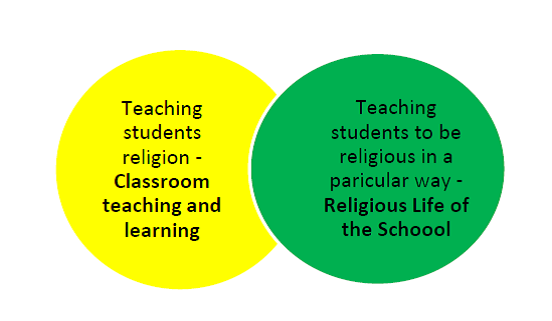The Religious Education program of the school follows Religious Education syllabus developed by the diocese of Brisbane. The Assistant to the Principal - Religious Education (APRE) oversees the implementation and review of the program. Part of the APRE's role is the facilitation of the prayer life of the school and coordinating with the staff and Parish Priest in its liturgical celebrations. Class masses, liturgies and celebrations of Reconciliation are all part of the program.
Education in Faith takes place in a number of different contexts. For the primary school child the main contexts for learning are:
Ideally, these three environments are as one in promoting the overall faith growth of the child. Although there are necessarily no clear boundaries with regard to the respective roles of family, school or parish, there is a specific focus for each.
-
In the Family - the child learns to live his / her faith.
-
In the School - the child learns to know his / her faith.
-
In the Parish - the child learns to celebrate his / her faith.
The contexts of Family, School and Parish should be seen within the broader context of society.
Our school seeks to encourage strong links between church and school. As well as class masses during parish times, we have Sunday masses that are organised and supported by all year levels. Your support is essential in maintaining these links.
Sacramental Program
Reception of sacraments is the responsibility of parents via the parish sacramental program. Our Religious Education program in the school supports parents in this role and catechises children in sacraments from Years 1-6. Children are eligible for First Reconciliation, First Eucharist and Confirmation in Yr 3.
Holy Cross Religious Education Program
The Holy Cross Religious Education Program supports the two dimensions of Religious Education and articulates our School Vision of educating and transforming lives through the message of the Cross for the life of the world. Our Religious Education Program aligns with the Brisbane Catholic Education Learning and Teaching Framework (2012) and aspires to develop the religious literacy of our students and nurture their faith formation.
Holy Cross Primary School is a Catholic learning community educating and transforming lives through the message of the Cross for the life of the world.

© Brisbane Catholic Education, Learning and Teaching (2020)
The Holy Cross Religious Education Program seeks to develop the religious literacy of students in light of the Catholic Christian Tradition, so that they might participate critically and authentically in contemporary culture. Students become religiously literate as they develop the knowledge, skills and dispositions to interpret and use language confidently in and for faith contexts and the wider society. It encompasses a set of ongoing activities and interactions among people.
These include
ways of talking, acting, creating, communicating, critiquing, evaluating, participating, ritualising, theologising, worshipping, reading, reflecting, and writing with others in a variety of religious and secular contexts.
© Brisbane Catholic Education, Learning and Teaching (2019)Learning & Teaching
We utilise a range of quality learning and teaching processes and resources to meet the diverse needs and capacities of our learners. The time allocation for the classroom religious education program is a minimum of 2.5 hours per week. Liturgy, prayer, hymn practice and other religious practices are not included in this provision. Teachers follow the Holy Cross Religious Education Plan outlining the learning and teaching of Religious Education for the year.
Assessing student learning is an integral part of the classroom. It improves learning and informs teaching. Teachers use a variety of assessment tools to gather and interpret information about student achievement in religious education. Teachers use the year level achievement standard to assess the extent of student knowledge, depth of understanding and sophistication of skills. Teachers use this information for reporting purposes (parent interviews and report cards - twice yearly) and to improve, enhance and plan for further learning in religious education.
Faith formation is reflected in the Religious Life of the School events. The Assistant Principal Religious Education publishes a termly timetable of religious events to staff, parents and the Parish Office. Students have the opportunity to participate in Eucharistic celebrations, Reconciliation and whole School activities and celebrations throughout the year.